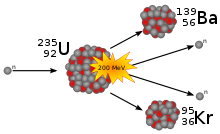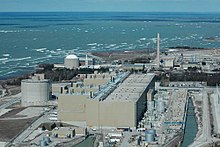Nuclear technology

The nuclear technology or nuclear technology , and Technology or colloquially nuclear technology called, is a technical discipline that deals with the use of nuclear reactions and radioactivity is concerned for the purposes of man. On the scientific basis of nuclear physics and chemistry and radiation biology , nuclear technology develops technical processes, devices and systems.
Sub-areas
Nuclear power technology

The field within nuclear energy technology (and probably also all nuclear technology) with the greatest importance for humans at the moment is the use of the energy released by nuclear fission processes for civil energy supply in nuclear power plants . The reactor technology describes the 'heart' of these power plants. Nuclear fission technology has been tried and tested on an industrial scale for decades and is currently (as of 2011) in use in more than 400 power plant reactors worldwide. In nuclear fission technology, the monitoring of the plant safety by plant installers, operators, authorities and experts is of particular importance.
For the most part independent of nuclear energy technology based on nuclear fission (fission), civil energy generation through nuclear fusion (fusion) is still in the research stage. This technology is based on a fundamentally different process and therefore requires completely different systems and processes. Experts see great development potential for this technology, but do not expect it to be ready for large-scale use until 2050 at the earliest.
A secondary area of nuclear energy technology is the use of nuclear energy as a vehicle drive , with very different technologies being used depending on the type of vehicle (also for space travel).
Nuclear weapons technology
Another form of use of nuclear energy, but in its destructive form, is nuclear weapons technology . This deals with the development of explosive devices based on nuclear fission ("classic atom bomb") and fusion ( hydrogen bomb ). Such weapons are mainly used for military purposes, and civilian use is only sporadic .
Fuel and waste treatment
Nuclear fuel technology deals with the extraction and processing of the necessary nuclear fuel for nuclear power plants and weapons as well as the reprocessing of fuel after use.
Another specialist area within nuclear technology is the treatment and storage of radioactive waste that arises during the operation of all types of nuclear facilities - not just nuclear power plants - and the dismantling of nuclear facilities after decommissioning.
Radionuclide technology
A diverse secondary field of nuclear technology is the use of ionizing radiation from radionuclides . There are a wide variety of possible applications in medicine, industry and research.
Probably the most important field of application here is medical technology , where radionuclides and their radiation are used in radiology and nuclear medicine both in diagnostics and in the treatment of diseases.
In medical technology, but also in materials testing and in other branches of industry and research, a wide range of core physical measurement, diagnosis, analysis and testing techniques are used.
Further applications for radionuclides and their radiation are, for example, food preservation through irradiation , ionization smoke detectors , tritium gas light sources and luminous paints , radionuclide batteries and heating elements , beta voltaics and many others.
Radiation protection technology
In a broader sense, nuclear technology also includes radiation protection, which is taken into account in all of the above-mentioned areas. This does not deal directly with the use of radioactivity, but on the contrary, with reducing the negative effects of radioactive and other ionizing radiation of artificial or natural origin. Radiation protection technology develops techniques to reduce or avoid harmful effects on the human organism and the environment on the basis of findings from radiation biology and radioecology .
Vocational training and activity
The need for skilled workers in the field of nuclear technology is also estimated by experts as high in the long term. This also applies to countries that have decided to phase out nuclear power (Germany, Switzerland, ...), because nuclear facilities that are to be decommissioned in the medium term still have high personnel requirements for the remaining operation, monitoring, orderly decommissioning and dismantling of the plants as well as the treatment of the waste. The high demand for skilled workers is offset by an aging workforce and a declining number of applicants, so that the career prospects for the next generation are rated accordingly good.
Due to the demanding theoretical background and the complexity of the subject as well as the high responsibility for the safe handling of the risks of technology, a higher education in the form of a university degree or further training as a specialist is generally required for a professional activity in the field of nuclear technology .
The study of nuclear technology belongs mostly to the engineering sciences , either as an independent study program or as a field of study within another subject, most of the mechanical engineering or process engineering . Alternatively, entry can take place via a corresponding specialization in natural science courses (nuclear physics in physics , nuclear chemistry in chemistry , ...).
In the field of apprenticeships there are also further training offers in the field of nuclear technology, such as a specialization in nuclear technology for power plants and power plant foremen or that of the specialist for decontamination / radioactive substances (decontamination specialist).
The online databases BERUFENET and KURSNET of the Federal Employment Agency provide information on study and training opportunities in the field of nuclear technology .
Study offers in Germany
In Germany, in the course of the nuclear phase-out, interest in working in nuclear technology has decreased significantly. As a result of the falling demand, the range of training courses at German universities has also been significantly reduced, although there are still numerous chairs at German universities that are active in the field of nuclear technology. Only a few universities still offer courses , specializations or specializations in the field of nuclear technology :
- Technical University of Munich : Nuclear technology course (Master or Bachelor)
- RWTH Aachen : Degree program Nuclear Safety Engineering (Master)
- FH Aachen / Jülich : specialization in nuclear technology in the mechanical engineering course (B.Eng); European Master of Science in Nuclear Applications (M.Sc)
- Karlsruhe Institute of Technology : Focus on nuclear technology and fusion technology (Master or Bachelor)
- TU Dresden : specialization in nuclear energy technology in the mechanical engineering course
- University of Stuttgart : Nuclear energy technology , application subject in the technical cybernetics course (Master or Bachelor)
"Applied nuclear physics" is classified as a small subject in German university policy . An overview of the specialist locations and the development of the number of professorships is given on a map of the Small Subjects Unit.
Associations
Companies and people who work in the field of nuclear technology are organized in various countries in professional , industry and specialist associations:
-
 Germany :
Germany :
- Nuclear Technical Committee (KTA)
- Association of German Engineers , Society for Energy Technology, Expert Committee for Nuclear Technology
- Nuclear Technology Society (KTG)
- German Atomic Forum
-
 Austria : Austrian Nuclear Technology Society (ÖKTG)
Austria : Austrian Nuclear Technology Society (ÖKTG) -
 Switzerland : Swiss Society of Core Experts (SGK)
Switzerland : Swiss Society of Core Experts (SGK) - International: Women in Nuclear
criticism
Critics reject nuclear technology - especially nuclear energy and weapons technology - because of the great potential damage to mankind, nature and the environment. In the opinion of the opponents, the dangers associated with nuclear energy technology are too serious and the risks cannot be adequately controlled. As evidence, they cite the various accidents , some of them serious , that have already occurred in nuclear facilities in the past. They therefore demand that the use of nuclear power be avoided .
literature
- Markus Borlein: Nuclear technology . Vogel, 2009, ISBN 3-8343-3131-7 .
- Dietrich Murswiek : The state responsibility for the risks of technology. Constitutional foundations and immission protection law implementation. Habilitation, 1984 (first habilitation thesis in the field of environmental law)
Web links
Individual evidence
- ^ H. Vogg, H. Braun, R. Spoon, A. Lubecki, A. Merz, J. Schmitz, J. Schneider, J. Vehlow: Application of radionuclide technology in chemistry and process engineering . In: Journal of Radioanalytical and Nuclear Chemistry . tape 32 , no. 2 , p. 495-510 , doi : 10.1007 / BF02517520 .
- ↑ Application of radioactivity in medicine, industry and research. Lecture. (No longer available online.) Chair of Nuclear Technology, Technical University of Munich , archived from the original on January 19, 2012 ; Retrieved October 4, 2011 . Info: The archive link was inserted automatically and has not yet been checked. Please check the original and archive link according to the instructions and then remove this notice.
- ↑ a b Timm Kaltenow: The last contingent . The nuclear phase-out has long since begun in universities - the younger generation is avoiding the subject of nuclear engineering. greenpeace magazine , accessed on October 5, 2011 .
- ↑ a b Hermann Horstkotte: Nuclear technology - course with residual risk. ZEIT ONLINE , March 25, 2011, accessed October 4, 2011 .
- ↑ BERUFENET - find job information easily. Federal Employment Agency , accessed October 4, 2011 .
- ↑ KURSNET - The portal for professional training and further education. Federal Employment Agency , accessed October 4, 2011 .
- ^ List of German chairs for nuclear technology and related areas. (No longer available online.) Www.kernenergie-portal.de, archived from the original on September 16, 2011 ; Retrieved October 5, 2011 . Info: The archive link was inserted automatically and has not yet been checked. Please check the original and archive link according to the instructions and then remove this notice.
- ↑ Studies. Chair of Nuclear Technology, Technical University of Munich , accessed on October 5, 2011 .
- ↑ Nuclear Safety Engineering M.Sc. Course description. RWTH Aachen , accessed on February 11, 2014 .
- ↑ Monika Schneiders: Studying nuclear technology after Fukushima. WDR , May 3, 2011, archived from the original on February 21, 2014 .
- ↑ Major in nuclear engineering. (PDF; 958 kB) Aachen University of Applied Sciences , accessed on July 2, 2012 .
- ↑ EMiNA. Aachen University of Applied Sciences , accessed on July 2, 2012 .
- ↑ Focus on nuclear technology and fusion technology. Institute for Fusion Technology and Reactor Technology (IFRT), Karlsruhe Institute of Technology , accessed on October 5, 2011 .
- ↑ Nuclear energy technology. Application subject in the technical cybernetics course. University of Stuttgart , accessed on October 4, 2011 .
- ↑ Joerg Starflinger: Application subject nuclear energy technology. (Powerpoint presentation; 5.4 MB) (No longer available online.) Institute for Nuclear Energy and Energy Systems, University of Stuttgart , July 20, 2011, archived from the original on January 19, 2012 ; Retrieved October 4, 2011 . Info: The archive link was inserted automatically and has not yet been checked. Please check the original and archive link according to the instructions and then remove this notice.
- ↑ see page of the Small Subjects Unit with the specialist locations of Applied Nuclear Physics, accessed August 21, 2015 ( Memento of the original from October 15, 2017 in the Internet Archive ) Info: The archive link was automatically inserted and not yet checked. Please check the original and archive link according to the instructions and then remove this notice.
